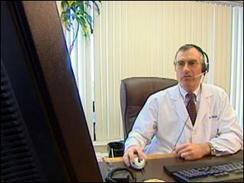Concierge medicine benefits from health reform

Adam Smith says health reform should be very, very good for the family doctor. When demand rises for what you do, it's a good thing.
Trouble is most physicians don't have the business savvy to take advantage of it.
NOTE: This is the third in our week-long series on business opportunities from health reform. Yesterday I wrote about real health insurance. Tomorrow I will talk about predictive health and we'll finish Friday with wellness coaching.

Health reform says everyone must have insurance. This means there is money available to provide everyone basic health services.
Instead of being paid for each office visit, this means doctors can be paid a fixed fee per-patient each year, using technology to meet the physical demands of care.
Many pediatricians are already concierges but don't know it.
My wife pointed this out to me. She still has the number of ours memorized, even though the kids are long grown. But we were constantly calling with each new bug, each time a new set of symptoms swept the schools.
Usually our doctor or his assistant would call to calm us down. Here's what is happening, here is what you need to do. Sometimes it was basic care. Sometimes it was something we could get over-the-counter at the pharmacy. Sometimes we were referred to the emergency room.
The doctor's problem was he wasn't paid for any of this. Unless we actually went into the office, and he could look in the ears, look down the throat, check their breathing and prescribe something, he made no money.
Concierge medicine changes that. There is a pot of money sitting there, waiting for use. The insurer wants to spend as little of it as possible on routine costs.
So give them that opportunity. Use e-mail. Have the phones manned by nurses who know what they're talking about. Give each patient an EHR and PHR. Have people train them to use these tools. Teach wellness skills. The per-patient income is fixed (over time it may come under pressure), but as you increase your efficiency you can take on more patients.
Concierge medicine may require the largest per-patient tech upgrade in the whole health care complex. Hospitals already automate so they can scale their back-offices and make sure they get paid. Small practices haven't scaled, thus haven't automated.
You call this a problem? I call it a barrier to entry for your competitors. Just as the shortage of generalists, which appears to be a problem, can be an opportunity to make a better deal for yourself.
So how about franchising? A company that provides a full solution can easily sign up other practices. They can even handle the marketing and back-office. You just slip in, keep an eye on operations, and watch the profits pile up.
Here's the problem, though. All this takes technology savvy and/or business skills. General care physicians don't get that in school.
The result is many generalists see this not as an opportunity, but a series of insurmountable problems that are incentives to retire. And reasons to complain that health reform is hard and nasty.
All of which means even more opportunity for those who do take the plunge.